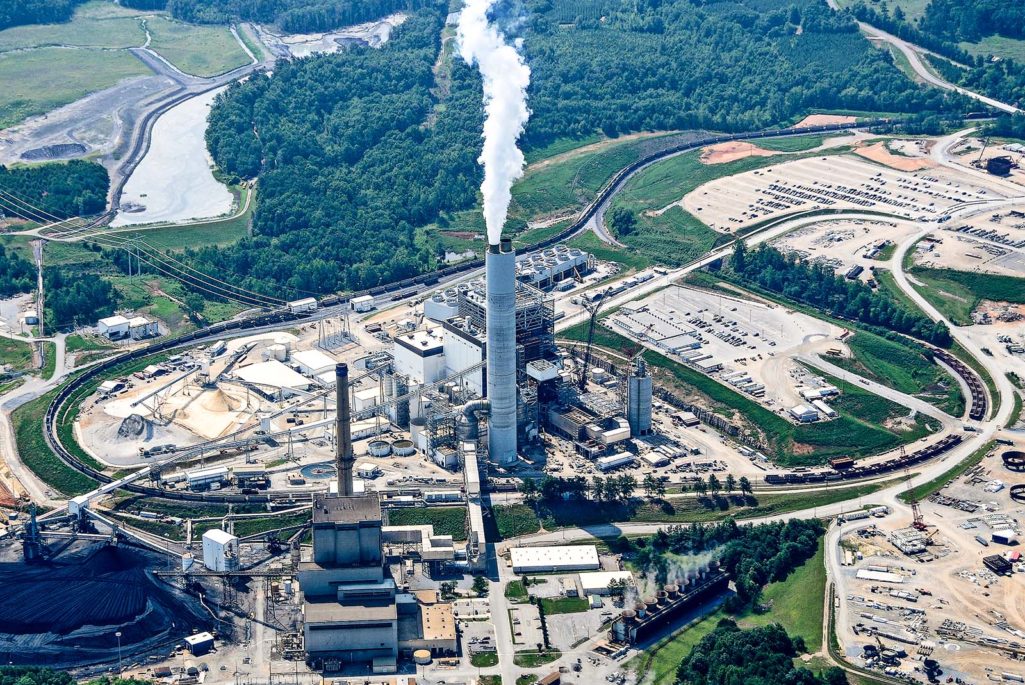Why the Future of Energy Hinges on Balancing the Energy Trilemma

Cliffside modernization. With the retirement of four older coal-fired units, the addition of new emissions controls on Unit 5 and the completion of the new state-of the art Unit 6, the modernized facility will emit 80 percent less sulfur dioxide and 50 percent less nitrogen oxide and mercury as compared to the five original units, while generating more than twice the electricity.
Photo: Duke Energy/Flickr
The goal of achieving a sustainable energy future depends on sound policy dynamics and a collaborative approach, according to the 2014 World Energy Council Trilemma report, released Monday.
Global energy systems are under increasing strain as governments limit spending during tough economic conditions. This jeopardizes the estimated investment of $48 trillion needed to meet the world’s energy demands during the next 20 years, which threatens countries’ ability to supply sustainable, reliable, and affordable energy, according to the report.
The Energy Ministers of the G7 underscored this threat with a recently issued joint statement on energy security. The fundamental principle they subscribed to was that energy security is a common responsibility. One country’s energy security relies on the energy security of a neighboring country, as well as on coordinated solutions to overcome weaknesses. However, the foundation for a successful collaboration on energy security is a policy framework that underlies a robust energy strategy in every country. To deliver long-term energy security, each country has to provide a balanced policy framework that also includes energy affordability, energy access, and environmental sustainability.
The WEC calls this balancing approach the energy trilemma and it is clear that much work remains to be done at a national level when it comes to balancing the energy trilemma and delivering on the energy security goal. The World Energy Council’s annual report also includes our Energy Trilemma Index that provides the world’s most comparative assessment of how countries perform in delivering sustainable energy systems. The index enables countries to visualize their energy system and identify areas for action.
However, as we consider the massive amounts of investment that will be required in the energy sector, political and regulatory risk is considered by investors the major factor preventing the mobilization of the capital required. Balanced policy frameworks that address the trilemma are the best guarantee to avoid sudden and dramatic policy changes—‘political risk’—and therefore a condition for the mobilization of the required capital. Ultimately, a good energy trilemma balance is a strong basis for the prosperity and competitiveness of individual countries.
The energy financing conundrum is analyzed in this year’s report, which highlights that there is enough capital available from the private sector if the right conditions are provided. But policymakers and regulators must clearly signal their future energy strategies, recognize the need for appropriate risk-reward structures, and put in place lasting policy and regulatory frameworks, free from populist political interference and in line with the framework the energy trilemma provides. It is clear that bridging the related skills is a critical success factor to deliver energy projects around the world and enable the energy sector to absorb capital.
The interviews we conducted also point to another daunting risk: Under regulatory pressure of Basel III (the global, voluntary regulatory standard on bank capital adequacy), banks may be obliged to reduce their infrastructure loans and increase their risk premium for project finance. Meanwhile, other forms of funding, including pension funds, are not yet prepared or incentivized to meet the challenge.
While the specific national context requires that every country find its individual solution to the best trilemma balance, it is clear that many energy challenges will have their most effective solutions in collaborations that go beyond borders. The three guiding questions that should drive international cooperation are:
- What are the fundamental energy-related objectives that can only be achieved through international cooperation?
- What creates energy insecurity that needs international fixing?
- And how to most effectively share uneven access to resources to the benefit of all involved.
With these questions in mind we must keep ambitions high for the 21st Conference of the Parties (COP21) meeting next year in Paris. The UN’s Sustainable Energy for All process has generated new dynamics in the international understanding, correctly identifying that energy access is critical for the entire development agenda—yet, the issue must now move from the heart to the feet.
It is important to highlight that the best foundation for collaboration in these areas, again, is strong and balanced national policies. This is specifically true for an international climate agreement: There can be no effective international climate framework in the absence of strong and balanced national energy policy frameworks. Well-functioning and balanced national energy policy frameworks are the only viable enforcement mechanism for an international climate agreement. With regards to COP21, the trilemma provides the natural platform to develop, assess and measure the requested “Intended Nationally Determined Contributions” to the United Nation’s Framework Convention on Climate Change process.
As we look to the post 2015 agenda for the energy sector, we see that the analysis undertaken over the past three years in our World Energy Trilemma work creates a strong foundation for countries to address the challenge of the energy trilemma. This year’s report shows that there is great opportunity to build a better future based on sound policy dynamics and a collaborative approach. With countries clearly able to benchmark their progress—reflecting the business adage that “what gets measured gets done”—leaders have valuable tools to drive competitiveness and ensure a sustainable energy future for all.
(Editor’s Note: Oliver Wyman, a subsidiary of Marsh McLennan, partnered with the WEC to produce the Energy Trilemma report.)




